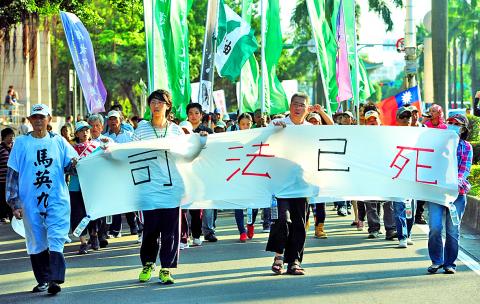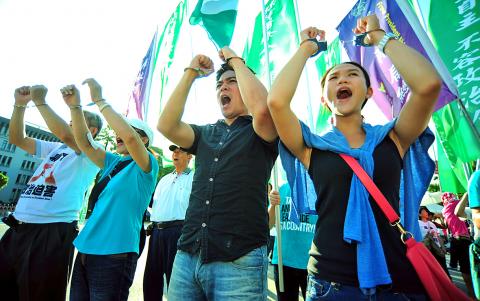More than 100 supporters of former president Chen Shui-bian (陳水扁) marched through Taipei yesterday, highlighting their demand that the government uphold his human rights.
The protesters, led by a new activist group called the Taiwan Democratic Human Rights Platform, called for the government to grant Chen medical parole so he could receive treatment at home.
“Defend medical human rights, grant A-bian (阿扁) home medical treatment,” the demonstrators shouted as they carried green and white banners bearing messages that decried political prosecution, with a squad of tricycles carrying large flags leading the way.

Photo: Lo Pei-der, Taipei Times
The group said Chen’s deteriorating health should have warranted medical parole long ago and that the former president was being denied home care for political reasons.
Taipei Veterans General Hospital physician Kuo Cheng-deng (郭正典), a member of Chen’s volunteer medical team, was among the many demonstrators who wore handcuffs during the rally in protest of Chen’s incarceration.
At one point, the procession arrived in front of Democratic Progressive Party (DPP) headquarters. Raising their handcuffed fists above their heads defiantly, in a gesture similar to one Chen made when he was first taken into custody in 2008, the demonstrators called on the DPP to live up to its pledge to fight for Chen’s medical parole.

Photo: Lo Pei-der, Taipei Times
The crowd congregated on Ketagalan Boulevard in front of the Presidential Office Building in the evening, demanding that President Ma Ying-jeou (馬英九) stop what they see as the political prosecution of his predecessor.
The parade was the final event in a series spanning the weekend.
A civic forum discussing the legal and medical aspects of Chen’s condition was held at Taipei’s Liberty Square on Friday night, while Saturday night featured an outdoor screening of the suspense-drama film Formosa Betrayed, followed by a candlelight vigil dedicated to Chen’s health.
Chen was taken into custody shortly after he left office in 2008. He is serving a 20-year term for accepting bribes during his eight-year presidency. Chen has been found guilty by the Supreme Court in four corruption cases.
Chen was transferred to a special medical zone of the prison hospital in June, after suffering from multiple complications, including severe depression, sleep apnea, non-typical Parkinson’s disease, a speech disorder and mild cerebral atrophy. He attempted suicide in prison last year, but was stopped by guards, reports from the Ministry of Justice said.
A recent poll conducted by the Taiwan Association for Pacific Ocean Development showed that 64 percent of respondents backed medical parole for Chen, while 23 percent were against the idea.

Taiwan is to commence mass production of the Tien Kung (天弓, “Sky Bow”) III, IV and V missiles by the second quarter of this year if the legislature approves the government’s NT$1.25 trillion (US$39.78 billion) special defense budget, an official said yesterday. Commenting on condition of anonymity, a defense official with knowledge of the matter said that the advanced systems are expected to provide crucial capabilities against ballistic and cruise missiles for the proposed “T-Dome,” an advanced, multi-layered air defense network. The Tien Kung III is an air defense missile with a maximum interception altitude of 35km. The Tien Kung IV and V

The disruption of 941 flights in and out of Taiwan due to China’s large-scale military exercises was no accident, but rather the result of a “quasi-blockade” used to simulate creating the air and sea routes needed for an amphibious landing, a military expert said. The disruptions occurred on Tuesday and lasted about 10 hours as China conducted live-fire drills in the Taiwan Strait. The Civil Aviation Administration (CAA) said the exercises affected 857 international flights and 84 domestic flights, affecting more than 100,000 travelers. Su Tzu-yun (蘇紫雲), a research fellow at the government-sponsored Institute for National Defense and Security Research, said the air

Taiwan lacks effective and cost-efficient armaments to intercept rockets, making the planned “T-Dome” interception system necessary, two experts said on Tuesday. The concerns were raised after China’s military fired two waves of rockets during live-fire drills around Taiwan on Tuesday, part of two-day exercises code-named “Justice Mission 2025.” The first wave involved 17 rockets launched at 9am from Pingtan in China’s Fujian Province, according to Lieutenant General Hsieh Jih-sheng (謝日升) of the Office of the Deputy Chief of the General Staff for Intelligence at the Ministry of National Defense. Those rockets landed 70 nautical miles (129.6km) northeast of Keelung without flying over Taiwan,

A strong continental cold air mass is to bring pollutants to Taiwan from tomorrow, the Ministry of Environment said today, as it issued an “orange” air quality alert for most of the country. All of Taiwan except for Hualien and Taitung counties is to be under an “orange” air quality alert tomorrow, indicating air quality that is unhealthy for sensitive groups. In China, areas from Shandong to Shanghai have been enveloped in haze since Saturday, the ministry said in a news release. Yesterday, hourly concentrations of PM2.5 in these areas ranged from 65 to 160 micrograms per cubic meter (mg/m³), and pollutants were